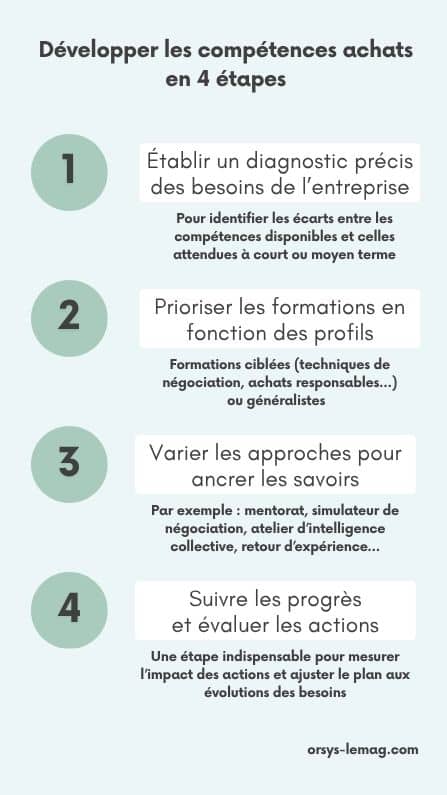In a constantly changing environment, purchasing skills are an essential strategic asset for companies. Faced with pressure on supplies, the acceleration of digitalisation and the growing importance of CSR requirements, purchasing professionals need to broaden their range of knowledge, know-how and interpersonal skills. But what are the key skills that need to be acquired or strengthened? And, in practical terms, how do you go about it? Here's how.

A successful buyer combines solid technical skills with human and strategic qualities to make an effective contribution to the company's objectives. What are the major trends reshaping the profession? What skills are essential? And how can they be developed?
The new challenges facing the purchasing function
Purchasing is an increasingly complex business.
Crises, inflation...
Geopolitical crises, raw material shortages, persistent inflation: purchasing functions are on the front line. This turbulence requires enhanced skills in risk management, trading under pressure and market analysis. Buyers need to react quickly, secure supplies and preserve margins, while integrating sustainable criteria. Agility and strategic vision are therefore essential.
The impact of digital transformation and CSR
The purchasing professions are marked by two major trends. Firstly, the responsible purchasing which can be integrated into all stages of the purchasing process, from needs analysis to supplier selection and collaboration. Secondly, theartificial intelligence (AI), which is having a significant impact on the day-to-day lives and skills of buyers, by automating repetitive tasks, improving data analysis and optimising decision-making.
Purchasing professions: a wide range of profiles
Operational buyer, specialist buyer (industry, IT, intellectual services, etc.), international buyer, public purchaser, supplierPurchasing professions cover a wide range of tasks, from managing supplies to defining global strategies. This diversity means that varied skills, both technical and interpersonal.
"The business has become more cross-functional and more strategic. Buyers are no longer simply executors, but key players in overall performance. Jérôme, Purchasing Director.
In this context, human skills continue to make all the difference. What's more, with the widespread use of digital tools (ERP, AI, e-procurement), soft skills - communication, ethics, critical thinking - remain essential. They also ensure the informed use of technology, promote long-term relationships with suppliers and strengthen the role of buyers in advising management.
Top 10 purchasing skills
Technical skills (hard skills)
1/ Commercial negotiation, a prerequisite for purchasing
The aim is to obtain the best pricing, contractual and quality conditions, but also to integrate social, environmental and ethical criteria into discussions with suppliers (for example, imposing sustainability standards). AI can also be used to analyse negotiation histories and market data to optimise negotiations.
2/ Cost analysis and adherence to budgets
Increasingly, buyers need to be able to assess the total cost of acquisition. Integrating AI makes it possible to carry out predictive modelling to anticipate cost variations.
"In assessing the overall cost of a new service provider, I discovered hidden logistics costs. Thanks to a three-year comparison, I was able to show that the cheapest option wasn't the most cost-effective. We avoided making a bad choice".
3/ Knowledge of markets and suppliers
This involves expertise in researching, evaluating and managing suppliers, as well as analysing market dynamics. Responsible purchasing also means identifying and selecting suppliers who comply with social and environmental responsibility standards (ISO 14001, CSR label).
4/ Management of contracts and calls for tender
Legal skills are sometimes required to draft, analyse and monitor contracts. This is also known as contract management.
When it comes to invitations to tender, the aim is to include specific clauses on responsible purchasing (respect for human rights, use of sustainable materials). AI can provide invaluable assistance in automating the drafting of contracts or analysing contracts (to identify risks or inconsistencies).
5/ Mastery of digital and ERP tools
The use of specialised software (SAP, Oracle or e-sourcing solutions) makes it possible to monitor and optimise purchasing processes. In this area, solutions that include AI are useful for automating sourcing.
Behavioural and interpersonal skills (soft skills)
6/ Communication skills
Strong communication skills are also needed to interact effectively with suppliers, internal teams and other stakeholders.
"One buyer recently told me that he had restarted a negotiation that had been blocked for three months simply by visiting the site to establish a climate of trust.
7/ Adaptability
Buyers need to react quickly to market fluctuations, supply disruptions or changing business needs.
"A supplier suffered a cyber attack, paralysing its deliveries. I immediately got the internal teams together, identified alternative sources and reconfigured our supply chain within a week. As a result, production was able to continue without disruption."
8/ Problem solving
Firstly, it means being able to analyse complex situations. Then it's proposing innovative, pragmatic solutions.
9/ Analytical thinking
Strong analytical and summarising skills are particularly useful for :
- using data to anticipate risks
- identify opportunities and make informed decisions
- but also to assess the impact of purchasing decisions on social, environmental and economic aspects...
- while ensuring overall profitability
Knowing how to use AI-enhanced data visualisation tools is a big plus.
10/ Sense of ethics
This is an undeniable advantage when it comes to creating lasting partnerships with suppliers.
"During an audit, I discovered that a supplier was not complying with certain social standards. So I proposed a compliance plan. He accepted. Since then, our partnership has become stronger and more responsible.

What practical solutions are there to strengthen purchasing skills?
A structured, evolving plan is needed. It is structured around 4 stages.
It begins with a precise diagnosis of the company's needsThe first step is to identify the gaps between the skills available and those expected in the short or medium term. This first stage identifies the gaps between the skills available and those expected in the short or medium term.
Training, the main lever for developing purchasing skills
Next, we need to prioritise actions according to profiles (operational, strategic, experts) and the company's objectives. Training courses should therefore be targeted: negotiation techniques, responsible purchasing, mastery of digital tools or analysis of supplier performance.
[Targeted training to develop purchasing skills].
Responsible purchasing
Incorporating social, environmental and ethical criteria into purchasing decisions reduces risk, stimulates innovation with suppliers and strengthens brand image. Would you like to improve your company's overall performance through responsible purchasing? Discover the training programme Responsible purchasing: reconciling purchasing performance and CSR issues.
Negotiations
Successful purchasing negotiations rely on a fine blend of technical expertise and communication. Do you want to learn best practice? Training Negotiating your purchases more effectively gives you the keys to preparing for negotiations, understanding your supplier and its offer, identifying negotiating levers and defining objectives in line with your company's strategy.
Legal aspects
What are the best practices for drawing up a purchase contract? How can you anticipate the legal risks associated with purchasing contracts? The course Mastering the legal aspects of purchasing contracts covers the fundamentals of commercial law, essential contract clauses, financial aspects and penalties, competition law and high-risk contracts.
Supplier relations
Would you like to identify good practice in monitoring supplier performance? Implement a dynamic of progress and quality? Involve your suppliers actively in this progress approach? Discover the training programme Optimize the performance of suppliers and subcontractors.
In some cases, general training is more appropriate: internal mobility, non-buyers involved in purchasing. It provides a solid foundation: business vocabulary, stages in the purchasing process, the role of the buyer, legal, economic and logistical issues. It's an ideal gateway to understanding the entire value chain.
Want to find out more? Discover the training programme The keys to the purchasing function.
Complementary approaches
Varying approaches maximises the impact of training to embed knowledge and develop soft skills.
For example, mentoring encourages the transmission of experience, feedback and learning in real-life situations. You can also add practical tools, such as negotiation simulators, to reinforce autonomy and continuous progress. Collective intelligence, in the form of workshops, feedback and buyer communities, also helps to ensure that skills are maintained over time.
Finally, the monitoring progress and l'evaluation of actions are essential to adjust the plan and measure its impact.

In the final analysis, investing in purchasing skills is much more than an HR approach. It's a strategic choice to better anticipate risks, innovate with suppliers, strengthen resilience and create sustainable value. In an unstable and demanding world, skills development is becoming a major competitive lever for the purchasing function.





